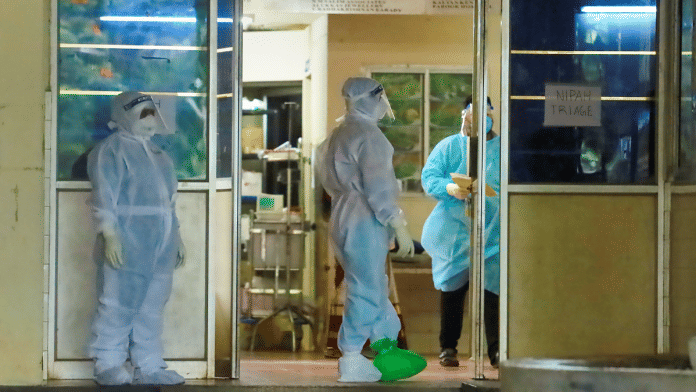New Delhi: India has sought 20 doses of a monoclonal antibody from Australia’s University of Queensland for the treatment of Nipah virus infection, Indian Council of Medical Research (ICMR) director general Dr Rajeev Bahal said Friday.
In a press briefing, the ICMR head said that the country, at present, has the therapy — procured from Australia in 2018 during the first Nipah virus outbreak in Kerala — that can be used in 10 patients.
Six cases of Nipah virus have been confirmed in Kerala so far, while 2 have succumbed to the disease, Bhala said.
India is currently seeing the sixth outbreak of Nipah virus, which kills 40 to 70 percent of the infected.
There is no treatment of the disease, whose primary reservoirs are fruit bats, but immunotherapeutic treatments or monoclonal antibody therapies — first developed by scientists in the US and then given to Australia through tech transfer — are currently under development and evaluation for treatment of Nipah infections.
One such monoclonal antibody, m102.4 (according to the US Centre for Disease Control), has completed phase 1 trial and can be offered to confirmed patients in the early stage of the disease, Bahal said.
Every confirmed patient, he said, needs two doses of the therapy. “In the first stage of the trial of the therapy (outside India), it was given to 14 Nipah virus patients all of whom had survived. India had procured some of the doses in 18 but could not use it as the outbreak was contained by the time it arrived,” he added.
Overall, India will have a stock of the treatment that can be used in 20 Nipah virus patients, once the fresh doses from Australia arrive, the ICMR director general said.
Australia, according to Bahal, procured the therapy from the US as it has seen occasional outbreaks of Hendra virus, a pathogen very similar to Nipah, which spills over from horses to humans.
“We have been informed that the therapy has shown to be stable up to 5 years. So, the doses procured in 2018 can be used now, but there is no data on the therapy’s stability beyond this period,” he said.
The DG clarified that as the medicine has not been clinically tested for efficacy and has not received regulatory approvals anywhere in the world, a decision to use it in any patients may be taken by the Kerala government, doctors, patients or their kin.
Bahal said that whole genome sequencing is currently underway to assess the exact variant behind the latest spread of the disease.
He also said that a Biosafety level 3 (BSL3) mobile laboratory that can tackle highly infectious pathogens capable of causing lethal infections has been stationed in Kozhikode — where the outbreak has been reported — to test samples from the suspects.
“So far, all the confirmed cases have been found directly linked with the index case and we are hoping to contain the spread at the earliest,” Bahal said.
(Edited by Tony Rai)
Also Read: 4th Nipah outbreak in Kerala since 2018: Origin of virus & why it strikes southern state so often






